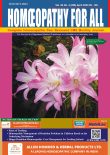Issues Concerning the Homeopathic Education Sector: A Professional Viewpoint
Keywords:
employability, Inadequate Infrastructure, exposure, UnderrepresentationAbstract
Homeopathy, a widely practiced alternative system of medicine, occupies a significant position in India’s healthcare and educational framework governed by the National Commission for Homoeopathy (NCH) under the Ministry of AYUSH. However, the homeopathic education sector faces persistent systemic challenges that undermine its quality, credibility, and potential for global integration. This article explores the major issues affecting homeopathic education from an expert standpoint. Addressing these multifaceted challenges is crucial to enhance the credibility, relevance, and future sustainability of homeopathic education in India. Homeopathy, developed in the late 18th century by Dr. Samuel Hahnemann, has evolved significantly in India. Governed today by the National Commission for Homoeopathy (NCH) under the Ministry of AYUSH, it boasts a structured system of education with undergraduate (BHMS) and postgraduate (MD Hom) programs. Despite structured curricula and institutional oversight, critical issues persist, particularly in infrastructure, faculty standards, patient inflow, research integration, and employability. These issues not only affect the quality of education but also diminish the credibility of homeopathy as a scientific discipline.




